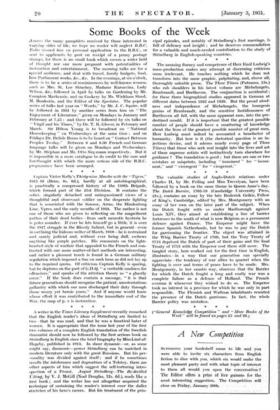Captain Victor Kelly's Thirty-nine Months with the "Tigers," ']915-18 (Senn,
8s. 6d.), hardly at all autobiographical, is practically a compressed history of the 110th Brigade, which formed part of the 21st Division. It contains the sober, singularly detached and unimpassioned views of a thoughtful and observant soldier on the desperate fighting that is associated with the Somme, Arras, the Hindenburg Line, Ypres, and the early months of 1918. The author is not one of those who are given to reflecting on the magnificent pathos of their dead bodies—from such neurotic hysteria he is poles asunder. If ever he lets himself go a little, it is over the 1917 struggle in the Bloody Salient, but in general—even in outlining the hideous welter of March, 1918—he is restrained and sanely judicial and, without ever being dull, eschews anything like purple patches. His comments on the light- hearted style of warfare that appealed to the French and con- trasted with our more matter-of-fact methods are interesting, and rather a pleasant touch is found in a German military regulation which imposed a fine on such hens as did not lay up to the required quota. Of criticism Captain Kelly is sparing, but he deplores on the part of G.H.Q. " a veritable madness for offensives," and speaks of the attrition theory as " a ghastly error." If the book does contain a message, " it is that future generations should recognize the patient, unostentatious gallantry with which our men discharged their duty through those• weary yet heroic years." And if anyone would learn whose effort it was contributed to the immediate end of the War, the map of p. v is instructive.
* * * *






































 Previous page
Previous page